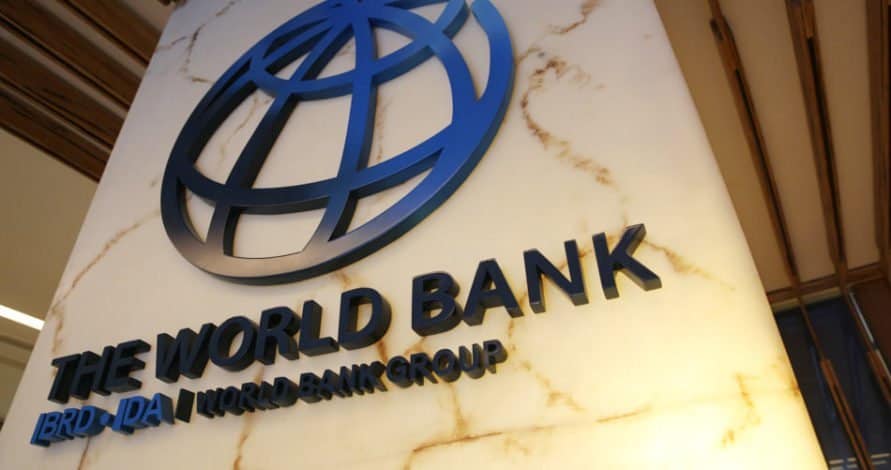Business
COVID-19: Nigeria’s Economic Outlook To Contract By 3.2% – World Bank
The drastic effect of coronavirus (COVID-19) on the World economy has created a negative impact on several developing countries like Nigeria as the Subsaharan African countries economy outlook shrink by 3.2 percent.

The drastic effect of coronavirus (COVID-19) on the World economy has created a negative impact on several developing countries like Nigeria as the Subsaharan African countries economy outlook shrink by 3.2 percent.
Naija News understands that the forecast for a contraction compares with a January projection for a 2.1 per cent expansion this year. It also represents a sharp drop when compared with Nigeria’s 2.27 per cent growth in 2019.
However, the World Bank, which made the latest forecast in its semi-annual Global Economic Prospects report released yesterday, also predicted that economic activity in Sub-Saharan Africa will contract by a record 2.8 per cent in 2020.
It said: “Economic activity in the region is on course to contract by 2.8% in 2020, the deepest on record. Per capita GDP is anticipated to fall even more sharply, likely pushing millions in the region back into extreme poverty.
“Growth could resume to 3.1% in 2021 assuming the pandemic fades in the second half of the year, that domestic outbreaks of the virus follow a similar path, and that growth in major trading partners rebounds.”
It further stated: “Sub-Saharan Africa faces daunting hurdles to contain COVID-19 given weak healthcare capacity, lack of access to basic sanitation, and the prevalence of informal economic activity across much of the region.
“The economy of Nigeria is expected to shrink by 3.2% this year, given the collapse in oil prices, which represent 80% of the country’s exports, about a third of banking sector credit, and half of government revenues. South Africa’s output is forecast to contract 7.1% this year, the deepest contraction in a century, as stringent but necessary containment measures curtail economic activity.”
It noted that the pandemic has taken a heavy human and economic toll on the region, causing the most serious disruption to region-wide economic activity on record.
“Sub-Saharan Africa has suffered as a result of the impact of the pandemic on its key trading partners, the disruption to global travel and supply chains, and the collapse in global commodity prices, particularly for oil and industrial metals. These shocks have heightened risk aversion among investors and prompted unprecedented capital outflows,” the World Bank said.
Warning that a longer-lasting and more severe pandemic would trigger an even deeper recession in the region and have devastating effects on the health and well-being of the population, the global financial institution said the effects of the pandemic could significantly increase the region’s vulnerability to debt distress.
“These strains will be compounded by the increased borrowing necessary to fund larger deficits,” the Bank said.
It further warned that: “Severely constrained government resources could lead to a curtailment of critical public services during the pandemic and further weigh on activity. There are also growing concerns that the pandemic may cause a food security crisis in the region as border closures and trade restrictions disrupt trading in food and agricultural products.
“The region’s large numbers of displaced people could complicate efforts to prevent the spread of COVID-19. In addition, there is the risk of social unrest as governments prioritize efforts to thwart the virus and peacekeeping efforts lose momentum. Rising unemployment, falling incomes, and potential shortages of essential items could lead to instability and weigh on activity well after the pandemic has faded,” the Bank said.
Meanwhile, the World Bank has also forecast that global gross domestic product will probably shrink 5.2% in 2020, the most since World War II this year and that emerging nations’ output will shrink for the first time in at least six decades due to the COVID-19 pandemic, reducing incomes and sending millions of people into poverty.
Per capita output will contract in more than 90% of countries, the biggest share since 1870. This decline may push 70 million to 100 million people into extreme poverty, Ceyla Pazarbazioglu, the World Bank’s vice president of equitable growth, finance and institutions, told journalists.
“This is the first recession since 1870 triggered solely by a pandemic, and it continues to manifest itself. Given this uncertainty, further downgrades to the outlook are very likely,” Pazarbazioglu said.
The International Monetary Fund (IMF), which in April forecast that Nigeria’s economy will contract by 3.4 per cent in 2020, but rebound with 2.4 per cent in 2021, will update its World Economic Outlook on June 24.
The IMF’s chief economist Gita Gopinath has said that the global outlook has worsened since April.












